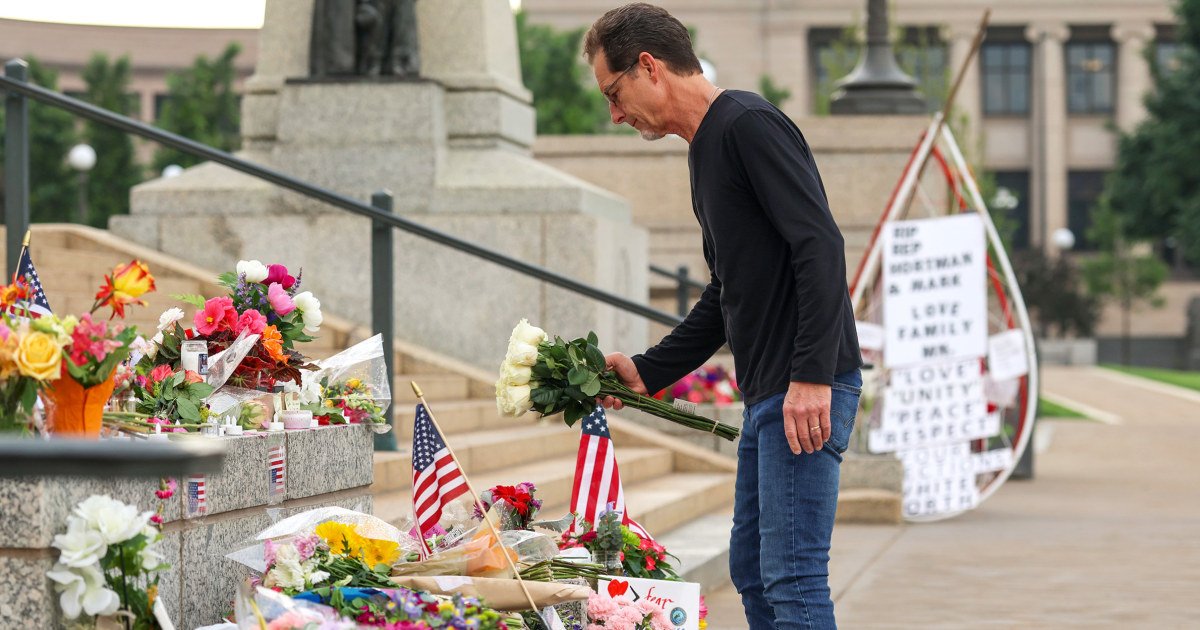Welcome to the online version of From the Politics Desk, an evening newsletter that brings you the NBC News Politics team’s latest reporting and analysis from the White House, Capitol Hill and the campaign trail.
In today’s edition, we explore the security concerns elected officials are harboring in the wake of the Minnesota shootings. Plus, Steve Kornacki explains why New York City’s Democratic mayoral primary may not be the end of the Andrew Cuomo-Zohran Mamdani battle.
Sign up to receive this newsletter in your inbox every weekday here.
— Adam Wollner
In Washington and across the country, lawmakers express safety fears
After the targeted shootings of two Minnesota lawmakers, elected officials serving in Capitol buildings in Washington and around the country are growing increasingly worried about the level of protection they receive.
In Congress: Law enforcement officials have been holding security briefings with members of Congress over the past several days, Scott Wong, Julie Tsirkin and Melanie Zanona report. Federal lawmakers have been told that they can spend money from their office budgets on home security systems and campaign cash on private security. Only a handful of congressional leaders get 24-hour protection from Capitol Police security details. Members can request extra protection, which is assigned based on whether Capitol Police determine there is an active threat.
But so far, those assurances have done little to calm nervous lawmakers, who have been harboring such concerns amid a string of violent attacks on American politicians over the past 15 years — a period that has included assassination attempts on a presidential candidate and members of Congress and a riot at the U.S. Capitol.
House Democratic leaders have asked Speaker Mike Johnson, R-La., to boost members’ official budgets “to support additional safety and security measures in every single office.” And over the weekend, House Republicans held a tense call that featured rank-and-file members’ expressing concerns about their safety when they are in their districts.
“It’s scary as sh–,” a senior House lawmaker said, describing how members of Congress feel after the Minnesota shootings.
In the states: Even the limited protection available to the average member of Congress goes far beyond what is available to most state lawmakers, Adam Edelman reports.
Outside of their state capital complexes, state legislators have little to no security protection. No state offers proactive security to members of its legislature, though law enforcement will typically step in if there are credible threats.
And despite the renewed attention to the issue, lawmakers fear little will ultimately be done that can make a meaningful difference, given that in many states, such positions are effectively part-time jobs with small budgets.
“We are constantly out there, vulnerable. Whether I’m volunteering somewhere, knocking doors for someone, starting to run my own campaign, I’m out there, vulnerable,” said Arizona state Rep. Stephanie Simacek, a Democrat.
Read more on the fallout from the Minnesota shootings:
Trump says he won’t call Gov. Tim Walz after Minnesota shootings, by Megan Lebowitz and Kelly O’Donnell
GOP Sen. Mike Lee deletes social media posts about the Minnesota shooting after facing criticism, by Dareh Gregorian
How Minnesota shooting conspiracy theories took over social media feeds, by David Ingram, Bruna Horvath and Adam Edelman
Political violence thrusts 2028 candidates onto the national stage, by Natasha Korecki and Jonathan Allen
No matter the result of the Democratic primary, NYC’s mayoral election could get chaotic
Analysis by Steve Kornacki
New York City is overwhelmingly Democratic, so it seems logical that the winner of the party’s mayoral primary next week will be a shoo-in for November. But it may not be that simple, as a confluence of factors could give rise to an unpredictable, multicandidate general election campaign.
Start with the two leaders in the Democratic race, former Gov. Andrew Cuomo and state Assemblyman Zohran Mamdani. Each carries significant political baggage.
Cuomo, of course, resigned as governor in a sexual harassment scandal in 2021 and has faced sustained criticism of his Covid pandemic policies, especially relating to nursing homes. Even within his own party, Cuomo is a lightning rod, with a recent poll finding that over 40% of Democrats have unfavorable views of him. And Mamdani is a democratic socialist with a history of far-left pronouncements that are now being featured in attack ads from the Cuomo side.
If either wins the Democratic primary, there figure to be plenty of unhappy customers within the party and — potentially — among general election voters who would be open to an alternative. And if one falls just short in the primary, either Cuomo and Mamdani could decide to turn around and take another shot in the general election. Each already has a ready-made vehicle to do so.
Cuomo has created his own third party, which he is calling the Fight and Deliver Party. Officially, he did that to give himself a second spot on the November ballot if he is the Democratic nominee. Under New York’s peculiar election laws, third parties can run major-party nominees as their own candidates. Cuomo’s position is that he plans to be both the Democratic nominee and the Fight and Deliver nominee.
But if Cuomo were to lose to Mamdani in the primary, there’d be nothing to stop him from simply running as the Fight and Deliver candidate. In fact, his father, Mario, made that very move back in 1977, when he lost the Democratic mayoral primary to Ed Koch but then ran as the Liberal Party candidate in the fall.
Meanwhile, the Working Families Party, which is closely aligned with progressive Democrats, has already indicated that it won’t back Cuomo even if he is the Democratic nominee. The WFP has also encouraged its backers to make Mamdani their top choice in the Democratic primary. That raises the possibility that Mamdani could run as the WFP’s general election nominee even if he loses to Cuomo next week. For that matter, given its antipathy to Cuomo, the WFP might also seek out another high-profile candidate if Mamdani isn’t interested.
If Cuomo or Mamdani do opt to mount third-party bids in the fall, it could open the door to chaos, since other candidates already loom.
The current mayor, Eric Adams, is bypassing the Democratic primary and already has created two vehicles for the general election, the “EndAntiSemitism” and “Safe&Affordable” parties. Adams, who faced federal corruption charges before President Donald Trump pardoned him, has his own political baggage but still retains some support, particularly from Black voters. That base, along with his incumbency, would make him a factor in a multicandidate general election.
Republicans also have their own ballot line and are set to nominate Curtis Sliwa, who was their nominee against Adams in 2021. And a former federal prosecutor, Jim Walden, is running his own independent bid. He is positioning himself as a centrist and says he was motivated to run after Adams was indicted last year.
Of course, it’s possible that the Democratic primary result will be decisive enough that the loser stands down for the general election. That would all but ensure the winner a glide path to Gracie Mansion. It’s also theoretically possible that another candidate besides Cuomo or Mamdani catches fire in the final week, claims the nomination and unites the party.
Read more:
- New York City Comptroller Brad Lander arrested at an immigration court, by Ben Kamisar
- Bernie Sanders backs progressive Zohran Mamdani in NYC mayoral race, by Ben Kamisar
🗞️ Today’s other top stories
- ➡️ Israel-Iran latest: Trump is considering a range of options when it comes to Iran, including a possible U.S. strike on the country, multiple current and former administration officials said after he met with his national security team in the White House Situation Room. Follow live updates →
- 🤝 Strange bedfellows: A group of lawmakers spanning a broad ideological spectrum have signed on to a resolution seeking to limit Trump’s power to get involved in the Israel-Iran conflict. Read more →
- ⬅️ Immigration backtrack: The Trump administration has reopened arrests of immigrant workers at hotels, restaurants and agricultural businesses. It’s a reversal after Trump said last week they were necessary workers whose jobs were almost “impossible” to replace. Read more →
- 🗣️ Going there: Sen. Alex Padilla, D-Calif., called Trump a “tyrant” in a Senate floor speech in which he recounted his forcible removal from a DHS news conference. Read more →
- 🪙 GENIUS Act: The Senate passed a landmark cryptocurrency regulation bill on a bipartisan vote of 68-30, sending it to the House. Read more →
- ⚖️ SCOTUS watch: Supreme Court Justice Ketanji Brown Jackson revealed she made more than $2 million from the publisher of her bestselling memoir as part of her financial disclosure report for 2024. Read more →
- ⚖️ SCOTUS watch, cont’d: Two educational toy companies today asked the Supreme Court to quickly hear their challenges to Trump’s tariffs. Read more →
- 📦 Tariff update: Trump signed an agreement that formally lowered some tariffs on imports from the United Kingdom as the countries continue to work toward a formal trade deal. Read more →
- ⚫ Reporting to prison: Former Sen. Bob Menendez, D-N.J., turned himself in at a federal prison in Pennsylvania to begin serving an 11-year sentence on bribery charges. Read more →
- 🗳️ If it’s Tuesday: It’s primary day in Virginia, but the general election matchup for the commonwealth’s highest-profile race is already set. Read more →
That’s all From the Politics Desk for now. Today’s newsletter was compiled by Adam Wollner and Dylan Ebs.
If you have feedback — likes or dislikes — email us at politicsnewsletter@nbcuni.com
And if you’re a fan, please share with everyone and anyone. They can sign up here.
#Washington #country #lawmakers #express #safety #fears #Politics #Desk



